

The science of Buddhism - The Dhamma Encyclopedia. From The Dhamma Encyclopedia Adapted from excerpts from a chapter in The Complete Book of Buddha's Lists -- Explained.
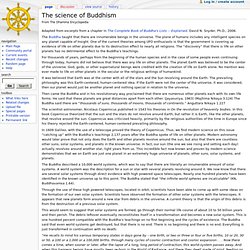
David N. Snyder, Ph.D., 2006. The Buddha taught that there are innumerable beings in the universe. Individual Healing: Ancient Ayurveda as a healthy modern lifestyle. Ayurveda is the most holistic medicine system existing Dhanvantari—Hindu God of Ayurvedic Medicine Ayurveda is a leading alternative medicine and probably the most holistic medicine system existing.
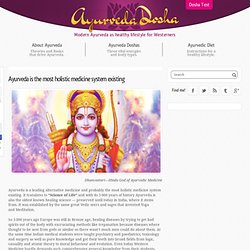
It translates to “Science of Life” and with its 5 000 years of history Ayurveda is also the oldest known healing science — preserved until today in India, where it stems from. It was established by the same great Vedic seers and sages that invented Yoga and Meditation. So 3 000 years ago Europe was still in Bronze age, healing diseases by trying to get bad spirits out of the body with excruciating methods like trepanation because diseases where thought to be sent from gods or similar so there wasn’t much men could do about them. Pre-Buddhist History. People of the Indus Valley Civilisation (also called Harappan Civilisation after the major city of Harappa) were mainly farmers, although recent finds are indicating a well developed culture.
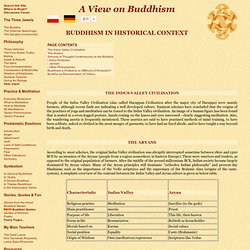
Eminent scholars have concluded that the origins of the practices of yoga and meditation can be traced to the Indus Valley civilisation. An image of a human figure has been found that is seated in a cross-legged posture, hands resting on the knees and eyes narrowed - clearly suggesting meditation. Also, the wandering ascetic is frequently mentioned. Buddhism & Hinduism,Comparitive Study of Buddhism & Hinduism,Compare Contrast Buddhism & Hinduism. "Buddhism, in its origin at least is an offshoot of Hinduism.
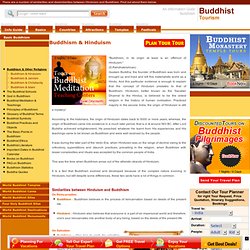
" (S.Rahdhakrishnan) Guatam Buddha, the founder of Buddhism was born and brought up and lived and left this materialistic world as a Hindu. HISTORY OF BUDDHISM. The Eight Auspicious Symbols of Buddhism - A Study in Spiritual Evolution. A constant intriguing factor in the imagery of the Great Buddha is the group of three curving conch-like lines on his neck.
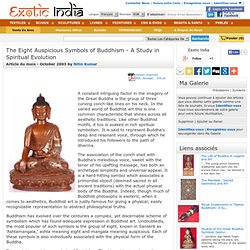
In the varied world of Buddhist art this is one common characteristic that shines across all aesthetic traditions. Like other Buddhist motifs, it too is soaked in rich spiritual symbolism. It is said to represent Buddha's deep and resonant voice, through which he introduced his followers to the path of dharma. Buddhist Symbols and Mudras (Gestures of the Buddha) Hinduism Origins, Hinduism History, Hinduism Beliefs. Understanding Hinduism. I am not going to start my article by defining the term Hinduism or by characterising who is an Hindu.
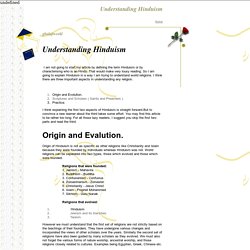
That would make very lousy reading. So I am going to explain Hinduism in a way I am trying to understand world religions. I think there are three important aspects in understanding any religion. Origin and Evolution. Scriptures and Scholars ( Saints and Preachers ). I think explaining the first two aspects of Hinduism is straight forward.But to convince a new learner about the third takes some effort. Origin and Evalution. Origin of Hinduism is not as specific as other religions like Christianity and Islam because they were founded by individuals whereas Hinduism was not. Religions that were founded: 1.
Who Was Buddha? Siddhartha, who came to be the Buddha, was born in Kapilavastu (Nepal) in 563 B.C.E, of King Shuddhodana and Queen Maya, rulers of Sakyas.

It is said that just before he was conceived, Queen Maya dreamed of an elephant with six tusks and carrying a lotus flower in its trunk, touched her right side. This dream was interpreted by Brahmins (learned men) that the child would be either the greatest king in the world or the greatest ascetic (a holy man who practices self-denial), and would be named Siddhartha, (meaning "he whose aim is accomplished"). Later when Queen Maya was going to her father's home to prepare for the birth, she stepped off her chariot in the Lumbini Gardens and held the branch of a sal tree to rest.
In that instant, Siddhartha emerged from her right side without any help. History of Buddhism, Buddhism History, Buddhism Religion History, History of Buddhism Religion. Here is a write up on the history of Buddhism.
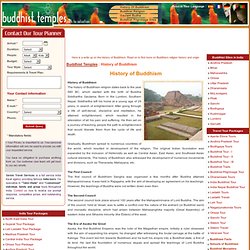
Read on to find more on Buddhism religion history and origin. Chart of Hindu Gods & Goddesses. God, Goddess, Hindu God Goddess, Indian God Goddess, God Goddess Images, Snaps, Wallpaper: List of Hindu Gods and Goddesses. India is the great country and one of the most religiously varied nation in the entire world.
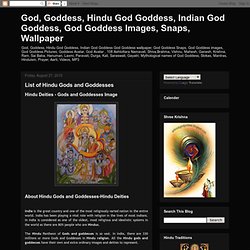
India has been playing a vital role with religion in the lives of most Indians. In India is considered as one of the oldest, most religious and idealistic systems in the world as there are 80% people who are Hindus. The Hindu Pantheon of Gods and goddesses is so vast. In India, there are 330 millions or more Gods and Goddesses in Hindu religion.
All the Hindu gods and goddesses have their own and extra ordinary images and deities to represent. Religion Universe: Hinduism, HINDU SCRIPTURES. The majority of Hindu scriptures are composed in the Sanskrit language.
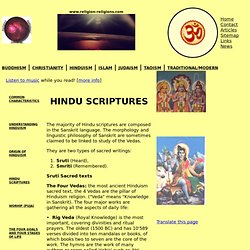
The morphology and linguistic philosophy of Sanskrit are sometimes claimed to be linked to study of the Vedas. They are two types of sacred writings: Sruti (Heard), Smriti (Remembered). Decode Hindu Mythology: 33 Devas. May Varuna with guidance straight, And Mitra the One-who-knows, And Aryaman in accord with Aditya, Guide us forth, like the wind that blows,As with their Might Evermore They guard the Sacred Laws, Shelter may they vouchsafe to us, Immortal Gods to mortal men..
The Vedic Seers of ancient India knew that mere words could not capture the essence of the Supreme Reality. However, they did not give up trying, and shared their visions as hymns dedicated to the various sentient beings guarding the natural and supernatural phenomena around them. These guardians of the Three Lokas were referred to as Devas (Sanskrit root 'Div' meaning the 'Shining One').
Hindu Holy Texts. Sacred Texts: Hindu Sacred Texts: The Vedas. Some sacred texts form the cornerstone of a religion, instilling law, character and spirituality in its people; some are narratives of historical figures in the faith. A text might be viewed as the unchanging “Word of God;” other texts are revised and expanded by later generations. Texts can be literal, or metaphorical, or both. This guide shows you how to find online versions, commentary and historical context of scriptures for Buddhism, Christianity, Hinduism, Islam and Judaism.
Ancient Origins Hinduism. Part II ...An Investigation of Hindu Scripture (Below) A Glossary of Hindu terms. The Origin of Hinduism. Hinduism is the world’s oldest living religious tradition. It is unlikely that there was a single founder of Hinduism, but if there were such an individual, he or she is unknown to us today. Although we don’t know the name of individuals, we do know several cultures that contributed to the development of Hinduism. Of these contributing sources, two are specially important for our understanding of the history of the Hindu tradition. The first is the Indus Valley civilization. The second source is a group called the Aryans, a nomadic group of people who might have migrated to India from Central Asia. It may be fair to say that Hinduism is not only the world’s oldest religion, it is also the most pluralistic. This pluralism has produced an attitude that denies the possibility of ever completely knowing the whole truth.
Hinduism is a tradition that honors all seekers after the truth and recognizes that different persons require different ways of relating to divine reality. Hinduism origins and variants. Hinduism and Medicine. By Amber Sukumaran There are many popular misconceptions about Hinduism and Medicine. In order to understand a Hindu's approach to medical treatment, it is very important to understand the basic concepts of Hinduism. The most important ones pertaining to health issues are outlined below. Hinduism is a very complex belief system. It is more than a religion--it is a way of life. Hinduism's steadfastness in its core principles and its abiltiy to adapt to modern changes have allowed it to last for many thousands of years.
First, let me explain a few basic concepts that pervade all sects of Hinduism and are relevant to medicine: Ahimsa (non-violence): Cause no harm to other living beings either by action, word, or thought. Karma: The universal law that what you put out into the world, either bad or good, comes back to you. How do Hindus view medicine and medical treatment?
What are the basic beliefs of Hinduism? Hindu Basics. Our beliefs determine our thoughts and attitudes about life, which in turn direct our actions. By our actions, we create our destiny. Beliefs about sacred matters--God, soul and cosmos--are essential to one's approach to life. Hindus believe many diverse things, but there are a few bedrock concepts on which most Hindus concur. The following nine beliefs, though not exhaustive, offer a simple summary of Hindu spirituality. Hindus believe in a one, all-pervasive Supreme Being who is both immanent and transcendent, both Creator and Unmanifest Reality. Buddhist Practices. Buddhist Beliefs Explained. Buddhism's core beliefs. The Life of Shakyamuni Buddha.